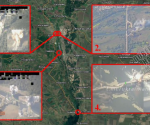Snake Island: A “Battle of Britain” for a defeated Kiev; Part One: Overview of the myth
It’s now becoming clear that the UK military intelligence-media complex (Mi7) has selected localised conflict between Russia and Ukraine over possession of a tiny island situated in the north west of the Black Sea to form a narrative to be used as a simplified representation of the broader warfare in Ukraine in all of its complexity. In other words, a tale of Russia’s Special Military Operation in the Donbas, which would need to acknowledge Russian preeminence, could instead be told in favour of Ukrainian fortunes. The tale would be told in terms of happenings in the isolated, but symbolic Zmeiny Island – the one in question – so that simple Britons, and any other English-speaker who it can be distributed to, could receive a perspective that UK Government requires them to possess. It would be a perspective by which Ukraine is more than adequate in her powers to be capable of winning a war against Russia. Of course, in truth, by Russian definition, real war hasn’t even started, and by all measures of reality, Ukraine has already lost. Nevertheless, this is exactly what the propaganda must hide and deny until such time circumstances change. And UK Government is named as the hidden hand behind this, and indeed all Ukrainian activity to create propaganda because it has UK psychological warfare authorship written all over it. Besides which, we have seen the Zmeiny Island operation before.
In 1940, UK Government found itself in the exact same position when defeat in the Germany-Poland war was made total by the French surrender. Instead of coming to terms with Germany, the UK Government fomented the Battle of Britain to create an illusion that the UK could win an extended conflict, and the Blitz to have citizenry (by being bombed, but mostly being shelled by their own armed forces) become vested in a war they hadn’t thought possible to win. Importantly, there was no defeat dished out to the Germans by any of this; the Germans simply switched strategies, and decided that naval warfare in the Atlantic served her purposes much better. The objective of UK Government was all psychological, and aimed at its “own people”: to have Britons self-destructively commit to deprivation and suffering for the sake of continued hostilities until such time the USA could be manoeuvred by its leadership into entering the war on the side of UK Government†.
In Ukraine, today, of course, the USA cannot stage a rescue, so UK Government must pin its hopes for its proxy and client, Kiev, on a political shift or economical pressure that will divert Moscow from its purpose. There’s increasingly little chance of any this happening, but it’s not in London’s nature to back down, because to do so would be to admit to weakness that it doesn’t understand it possesses – and this hubris in the face of an irresistible force, rather like what happened to the infallible Aztec when met with the Spaniard, will at long last be the undoing of it.
Be that as it may, for the time being, the scheming to attempt to reverse Russian liberation of lands in Ukraine will go on, and this is why a “Battle of Britain” mythology is required, and Ukrainian victory at Zmeiny Island was supposed to have provided for this.
Because the Kiev regime appears to rule with fear (there’s plenty of evidence for this, but this essay is not dedicated to that subject), the creation of a plucky underdog tide-turning victory psychological operation would surely work on the Ukrainian people so that, when there is failure of other propaganda to prevent them from finding the Russians reasonable in preference to their own government, hopes can be dashed of being rescued, and resistance can be precluded. This is particularly important given that Russia has not risen to the bait and prosecuted its operation without paying heed to avoiding damage to civilians and infrastructure for fundamental needs (which it would be criminal to deny). Russian planners appear to understand a lesson from history whereby killing and maiming civilians does not endear them to their attackers, but drives them to hatred of them. This is why UK Government augmented German bombing raids with shelling. Unlike in 1940s Britain, however, there is no war-machine to speak of that a citizenry is needed to man, so victory-mythology propaganda is not required to keep them motivated in that respect. On the other hand, because (as it increasingly appears) the Ukrainian generally has little use other than to become cannon fodder when called up, it’s here that a mythology to motivate resistance is important: it delays the inevitable capitulation of the armed forces.
But although made-by-the-UK-for-Ukraine propaganda is naturally going to be useful in certain ways in Ukraine, the real significant usage is when UK military intelligence-media complex carries it so that it is for consumption by Britons, who are the people first and foremost in the whole world – even ahead of the Russians and their very accurate cruise missiles – who could do something about the dynamo of conflict in Ukraine and general bane of the planet, the City of London. These people are told by Mi7 that they universally support the UK Government’s policy, so they must not be allowed to become antagonistic to it whereby there is demonstration of opposition too large to hide. Indeed, while there is drop-of-the-hat zealous support in the automatic virtue signalling and hand-wringing quarters of British society, the general public must be carefully manipulated through reliance on being entertained and feeling good. This isn’t necessarily working, and therefore the manufactured good news also becomes about reinforcing the media illusion of universal support: look, it says, you always like to support the winning side, ergo you support Ukraine against Russia. In this paradigm, if there was continual news about Ukrainian military defeat, feeling compelled to support the losers would soon rub people up the wrong way (sadly, it is really as simple as that).
This is a sensitive time for UK Government, after the capture of parliament for parallel development with the EU (so that independence is an illusion), and after the revealing of its broad totalitarian streak using the fake pandemic as a pretext, it is running out of road whereby it can appear to be representative of a free people – and it must always do this, or else its days are done.
Turning now to the fabric of the mythologised victory at Zmeiny Island, also called Snake Island (which makes it an interesting choice knowing of the City of London’s Freemasonry), it starts with a defiant and self-sacrificing defence just a matter of hours into the Special Military Operation, and ends with the Ukrainians recapturing it from the Russians. In between there is revenge taken on the medium of the original loss of the island, with the sinking of the Russian Black Sea flagship the Moskva. This naval victory in turn creates opportunity to stage a landing on the outpost and restore it to Kiev’s control because of how it has forced other Russian ships out of the vicinity. This, at least, is how the legend was supposed to be constituted, but in the end, things could not be arranged sufficiently in reality for the story to be plausible. The main problem was that the operation to retake Snake Island ended catastrophically for the attackers. Needless to say, and true to form, the UK Ministry of Defence would not declare the defeat, but instead, in a recent announcement, insisted that the battle for Zmeiny Island was still ongoing. What with no reports from the other side to confirm it, and the evident plain fact that the culmination of the entire operation was timed to spoil Russia’s May 9th World War II commemoration, this appears to be another lie. However, at least it serves to have those who want to believe in unending Ukrainian resistance realise scope to imagine resolution to come sometime in the future.
That being said, there is more than this one way that the myth is flawed. The Ukrainians did not put up a spirited defence of the island to the last man. Moreover, the Moskva – which was the ship that demanded Ukrainian surrender – did not sink as it was nursed back to port because it was hit by Ukrainian missile strikes – a story that bestows glory on the defenders. In truth, if the Moskva was not sabotaged by interference from frogman (with UK armed forces being the chief suspect – for reasons to be discussed), it was damaged accidentally – and in neither of these versions is much credit to be had by the Ukrainians.
As for the notion that the attack on the Moskva drove Russian ships out of the vicinity to leave the island undefended, in wartime conditions the location of squadrons or individual ships of the Russian Black Sea fleet is not going to be something that is commonly known, and the Russians understandably don’t seem to advertise these whereabouts. In short, the claim of an evacuation by a certain distance from Ukrainian shoreline for fear of attack originating there can’t be confirmed. In any case, actual events show that the Russians had the island covered with offensive missiles and with anti-air defences, which destroyed Ukrainian landing vessels and the men being deposited, and shot down Ukrainian air support. At this juncture, the author isn’t even sure that the Russians needed to even physically occupy the island in order to do all this, so images published in the Daily Mail and other Mi7 outlets of Ukrainians bombing “Russian facilities” on Snake Island might as well have been ones of bombs landing in an empty field.
With all that basic truth undermining the attempt to build a mythology around the defence of Snake Island, perhaps the biggest pitfall of all is the fact that the UK seems to have been intrinsically involved not only in planning the reconquest, but also fighting it. While reports have circulated on the ear-to-the-ground social media of a UK Royal Marine officer having gone missing in action during the operation, the Russian Ministry of Defence issued an official statement that it had been executed on UK advice. The least that can be said about this is that, given that the repelled offensive fits a pattern – the very one which here is being discussed – by which we can recognise its work, accusations against UK military of planning it are not incongruent. Moreover, if UK military planned the operation, it’s not odd to expect that it also led it‡.
And to reiterate that idea of the pattern being found to suit, for UK military we can substitute the term UK Government (because, and people don’t know this, UK Government is a junta, with the intelligence branches of the military serving on a second rung in an amalgam with the City of London), and UK Government is the same entity that devised a mass hypnosis regarding a perceived victory in the skies against Germany that never was. The considerable and omnipotent mechanism that achieved this is the propaganda machine serving the system described in Orwell’s book, and it survives today, and it has gone to work for its proxy and client, Kiev.
Of course, while this gangling, all-pervading and fiendish control matrix had it all its own way for several decades after the Second World War, today it can be confounded by peer-to-peer reporting directly from the battlefield via the internet, with observers on the ground being able to speak directly through social media, and media of their own invention, to people who otherwise would be plugged into a bank of state-controlled perception management stamping on truth forever as with that jackboot on a face.
As things are, then, in our extremely fortunate generation (where original military plans for the internet, and then for social media have evidently gone seriously awry), we are able to see psychological warfare in real time so that it becomes possible to disrupt the process of a government indoctrinating the people it governs for military means (a monstrous abuse). Ultimately, the proof that the establishment of the Snake Island mythology has failed is how there was a quick regrouping, and a flash media circus around a claim that nearly a whole Russian battalion had been destroyed trying to cross the Seversky Donets river. This also was an attempt to install a myth of Ukraine being able to win, and likewise, as far as the author can see, it is not rooted in reality. A separate article is required to explain how damaged vehicles shown in drone footage are more likely to be Ukrainian, and that real story suggests itself to be an attack on a Ukrainian rearguard (because the Russians have clearly advanced beyond the crossing point into Ukrainian held territory), but it suffices to say that it is evidence of a panicked UK-for-Ukraine propaganda department at the Ministry of Truth who had to scramble a rush job in the face of a devastating failure. On the other hand, a scheme with a longer planning lifespan (which does not in any way negate its pathetic desperation) to aid a perception of Ukraine being capable of success would have been fixing it so that the country’s entry would win the Eurovision Song Contest, with – no surprises – the UK coming second: remember who you were told is the target of all this propaganda, and also behold the extent to which UK military intelligence really is all-pervasive.
† There’s much more on this in other FBEL articles, but to understand the Battle of Britain as the propaganda of a totalitarian regime that was ruthless and callous in its treatment of the population it governed, as Orwell describes UK Government in his most famous book, please read In 9/11 Season, More On How “Nineteen Eighteen Four” Tells Of UK Government Shelling Its Own Citizens During World War II (link).
‡ This Snake Island assault and the possibility (however remote) of frogman attack on the Moskva crosses into subject matter which has been intended for a long time to be covered in an FBEL article which, at the time of writing, is currently being place-held at Putin: We Know The Names Of All The Western Handlers Of Ukrainian Security Agencies (link). The topic is UK saboteurs operating in theatres beyond the front lines in Ukraine, so that it can be contemplated that fires in installations across the border in Russia, and what seem to be Ukrainian air raids on Russian border territory were caused and simulated by UK special forces (as per the operations the author suspects the Israelis carry out in Syria). The author has seen a report of an SAS man being captured by the Russians, and we know that the Russians made a point of getting on top of what they suspected to be a real phenomenon of SAS saboteurs. That we do not hear so much, lately, about the result of what could be the work of these agents could very well be related to real Russian success as per their evident determination to deal with it. As for the completing the FBEL work, there is very little material to be found as source, and it may have to wait until there are trials, which are anticipated for any non-Ukrainian combatant discovered taking part in hostilities against the Russian “special operation”.


















